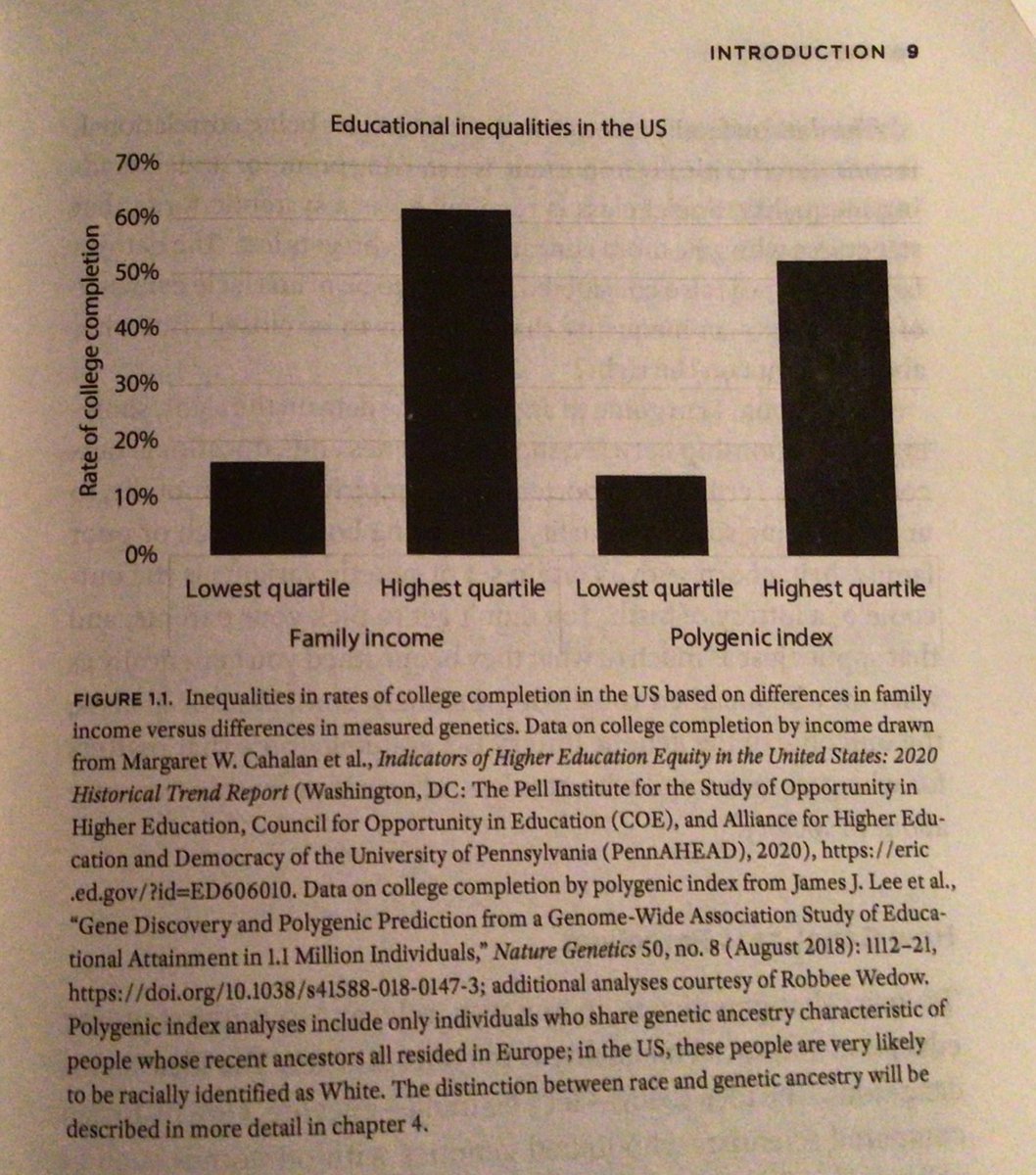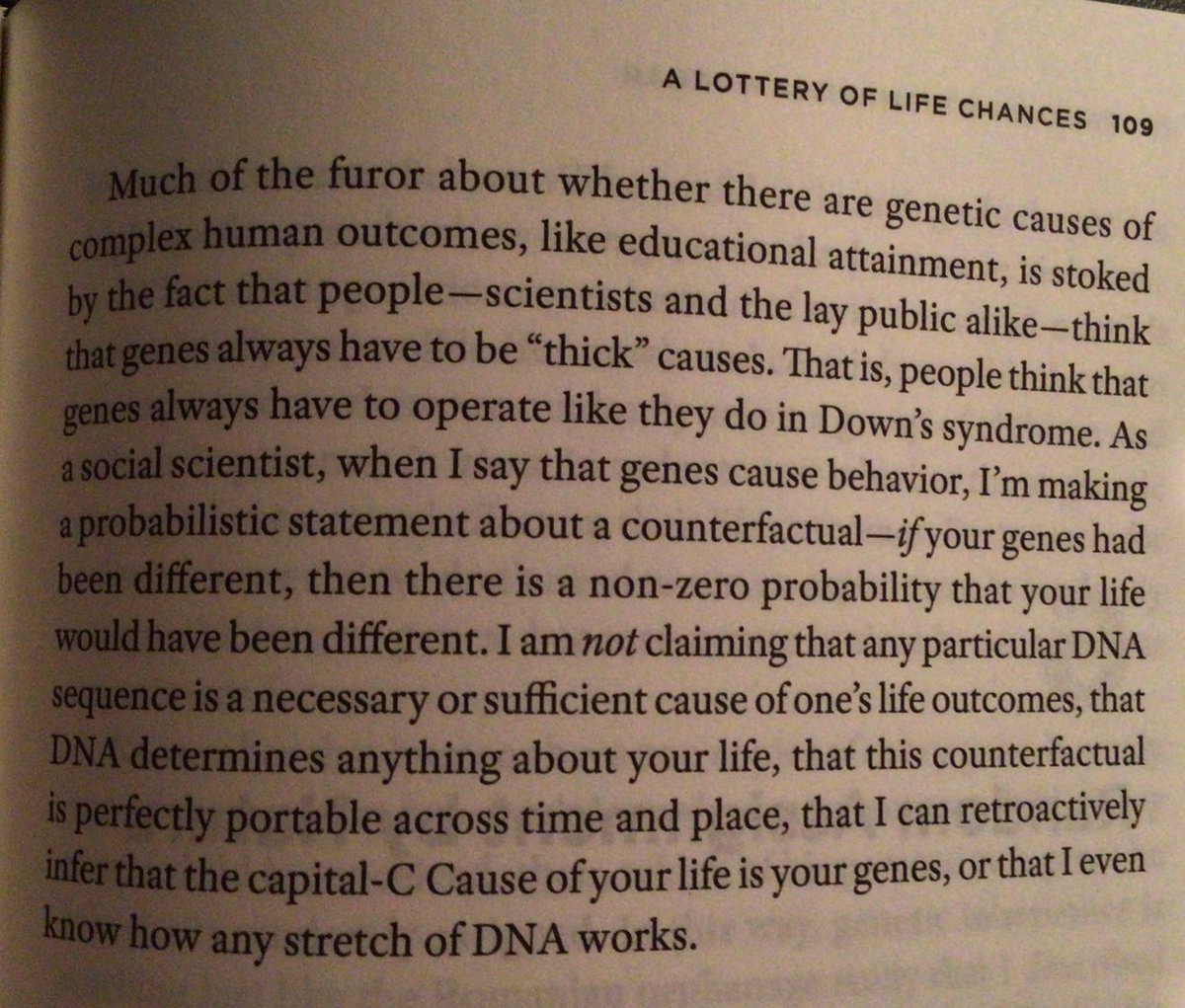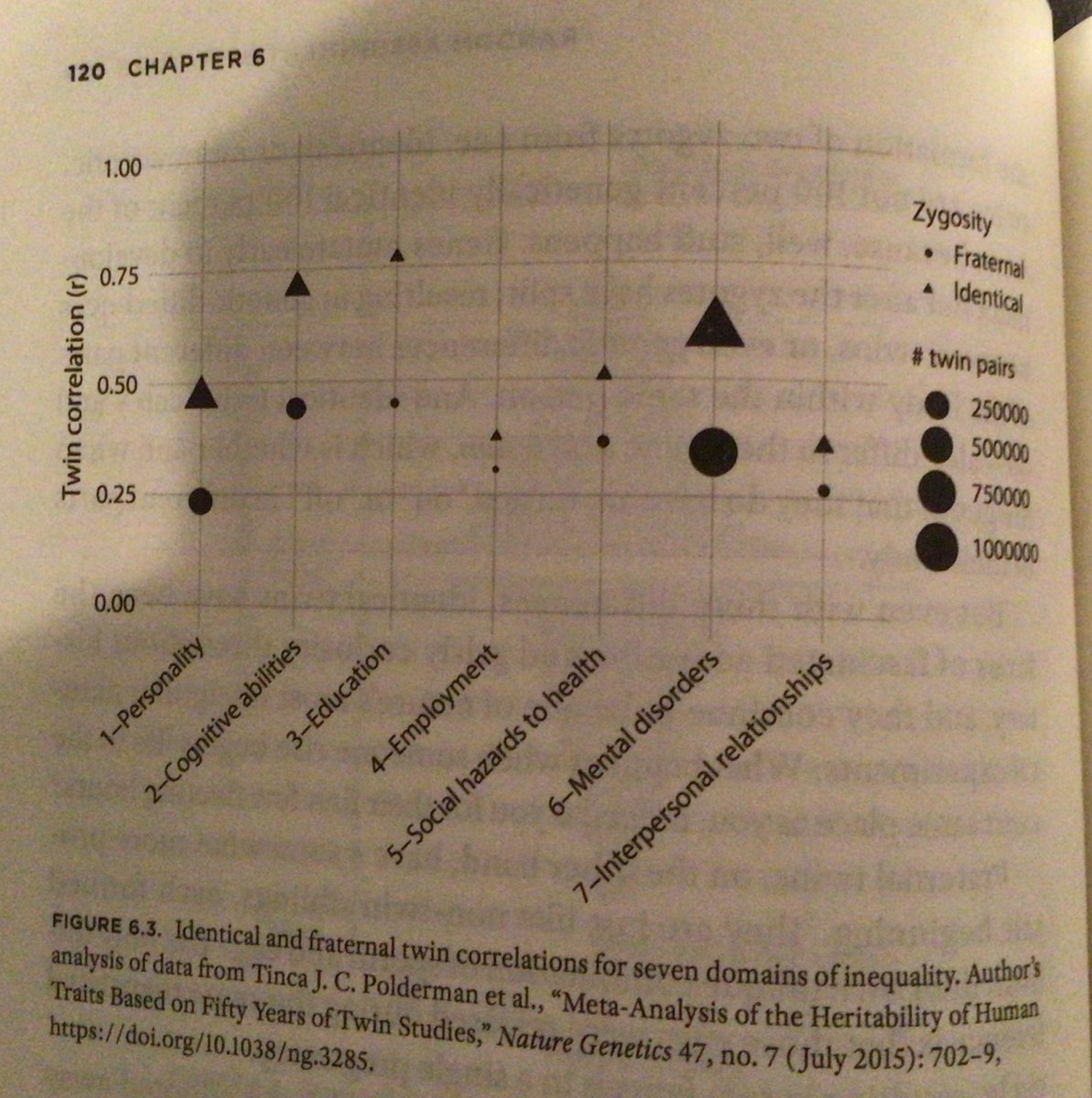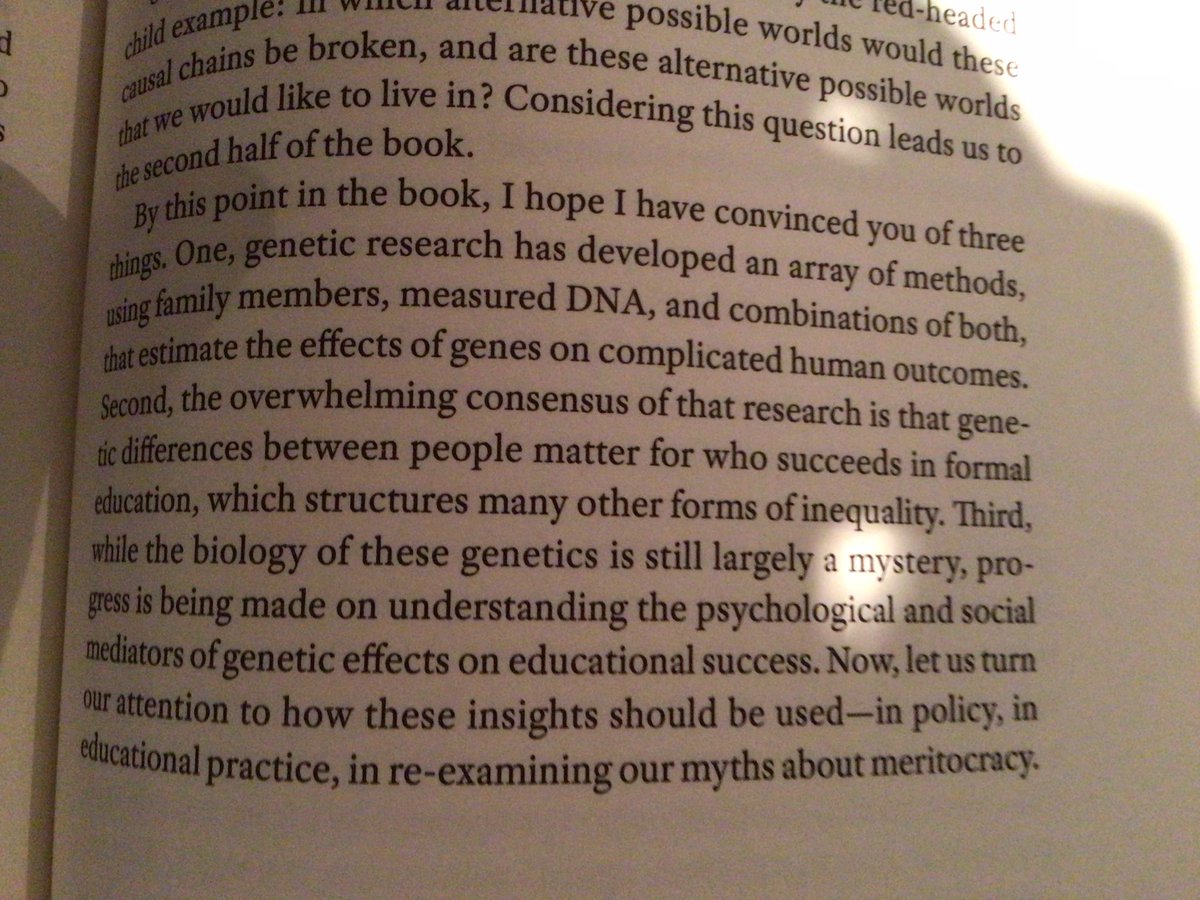Reading The Genetic Lottery: Why DNA Matters for Social Equality
By @kph3k (Kathryn Paige Harden)
https://www.goodreads.com/book/show/57423806
In this book, I am going to argue that the data on the right, showing the relationship between measured genes and educational outcomes, is also critically important, both empirically and morally, to understanding social inequality.

(…) And, like social class, the outcome of the genetic lottery is a systemic force that matters for who gets more, and who gets less, of nearly everything we care about in society. p10
In this book, I will argue that it is NOT eugenic
🔹to say people differ genetically
🔹genetic differences btwn people cause some people to develop certain skills and functionings more easily.
🔹to document how systems & markets reward people for genetically influenced abilities
What IS eugenic: attaching notions of inherent inferiority and superiority, of a hierarchical ranking or natural order of humans, to human individual differences, and to the inheritance of genetic variants that shape these individual differences…
What IS eugenic: developing and implementing policies that create or entrench inequalities between people in their resources freedoms, and welfare on the basis of a morally arbitrary distribution of genetic variants.
p20
Anti-eugenic project:
1️⃣ understand role genetic luck plays in shaping bodies & brains
2️⃣ document how our current systems reward people w/ certain types of bodies & brains
3️⃣ reimagine how those systems could be transformed to include every one, regardless of the genetic lottery
Goals of book:
1️⃣ convince you that genetics do matter for understanding social inequality
2️⃣ what we should do with the knowledge that genetics matter for understanding social inequality
The resulting combinatorial explosion of potential child genotypes from any two parents is mind-boggling: each pair of parents could produce over 70 trillion genetically unique offspring.
p31
One’s genes do not determine one’s educational or financial fate.
At the same time, however, it would be a mistake to dismiss the relationship between genes and education as trivial or unimportant.
p46
(If you find it surprising that someone would devote years of their life to a project assembling a data set with 120,000 people in order to prove definitively that other people were wrong, then you haven’t spent that much time with economists.)
p47
https://www.science.org/doi/10.1126/science.1235488
David Lewis described a cause as “something that makes a difference, and the difference it makes must be a difference from what would have happened without it”
Lewis’s definition of a cause is all about the counterfactual
I’m making a probabilistic statement about a counterfactual – if your genes had been different, then there is a non-zero probability that your life would have been different.
p109

“Meta-Analysis of the Heritability of Human Traits Based on Fifty Years of Twin Studies,”https://doi.org/10.1038/ng.3285.
Over 2,000 scientific papers on over 17,000 traits measured in over 2 million twin pairs.

results from 50 years of twin research & few years of research using measured DNA;
the inescapable conclusion is that genetic differences between people cause social inequalities including inequalities in educational attainment, but also in physical health outcomes
p129
Conceptualizing the links between genetics and social inequality in terms of a short, biological, and universal causal chain saps political will to address inequality…
…As the evolutionary biologist Theodosius Dobzhansky summarized back in the 1960s, “the favorite argument of conservatives has always been that social and economic status merely reflects intrinsic ability.”
p135
There are three lines of evidence (twins, GWAS on education, GWAS on non-cognitive var in education; see ref) that suggest that the development of non-cognitive skills is part of the pathway connecting genes to educational outcomes.
p142
https://www.nature.com/articles/s41588-020-00754-2

1️⃣array of methods estimate effects of genes on complicated human outcomes
2️⃣overwhelming consensus: genetic differences btwn people matter for who succeeds in education
3️⃣progress on understanding the psychological and social mediators of genetic effects on educational success

But both things can be true at the same time: genetics can be causes of stratification in society, and measures to address systematic social forces can be effective at enacting social change.
p155
The treatment of PKU (phenylketonuria) with diet, just like the treatment of myopia with eyeglasses, reminds us of a point I was making earlier in this chapter: genetic causes can have environmental solutions.
p160
Equity and quality are not always in opposition.
In all three examples, positive environmental difference disproportionately improved the outcomes of people who were at highest genetic risk for poor outcomes
p166

Links/references to the three examples:
Obesity: Barcellos, S. H., Carvalho, L. S., & Turley, P. (2018). Education can reduce health differences related to genetic risk of obesity. Proceedings of the National Academy of Sciences, 115(42), E9765-E9772.
“We find that the additional education generated by the policy benefited those with higher genetic risk of obesity the most, reducing the gap in unhealthy body size between those in the top and bottom terciles of genetic risk of obesity from 20 to 6 percentage points.”

Alcohol problems: Kuo, S. I., Salvatore, J. E., Aliev, F., Ha, T., Dishion, T. J., & Dick, D. M. (2019). The family check-up intervention moderates polygenic influences on long-term alcohol outcomes: Results from a randomized intervention trial. Prevention Science, 20(7), 975-985.
These results demonstrate that modifying environments of genetically vulnerable youth could reduce the likelihood of developing alcohol dependence and underscore the significance of environmentally focused prevention and intervention efforts.
Math drop-out: Harden, K. P., Domingue, B. W., Belsky, D. W., Boardman, J. D., Crosnoe, R., Malanchini, M., … & Harris, K. M. (2020). Genetic associations with mathematics tracking and persistence in secondary school. NPJ science of learning, 5(1), 1-8.
Compared to disadvantaged schools, advantaged schools buffered students with low polygenic scores from dropping out of math


Chapter 9 Using Nature to understand Nurture
While media discusses behavioral genetic research in terms of designer babies and surveillance capitalism, researchers who are creating & working with polygenic indices for traits such as education are geeking out about control variables and less-biased parameter estimates. p188
In a classic study of twins separated at birth and raised in separate households the averge difference in intelligence test scores between twins was about equal to the average difference in the test scores of a single person who took the test twice.
https://www.science.org/doi/abs/10.1126/science.7195071
We should not interpret genetic influences as deterministic.
We should not give up on the possibility of social policy to bring about social change.
We should not confuse an outcome being socially valued with a person being valuable.
p232

I hope to start the conversation about what it means for science and policy to be actively anti-eugenicist, by offering five general principles:

Some ppl happen to inherit genetic variants that, in comb w/ environments provided by parents & social institutions, cause them to be more likely to develop a suite of skills and behaviors that are currently valued in the formal education systems of Western capitalist societies.

Oorspronkelijk getweet door Wilte Zijlstra (@wilte) op 9 februari 2022.
Also see: De nature en nurture van sociaal-economische verschillen bij Dag van het gedrag 2021


& my Twitter thread of Plomin’s Blueprint
& Plomin, R., DeFries, J. C., Knopik, V. S., & Neiderhiser, J. M. (2016). Top 10 replicated findings from behavioral genetics. Perspectives on psychological science, 11(1), 3-23.:
Klik om toegang te krijgen tot 2016-plomin.pdf
- All psychological traits show significant and substantial genetic influence
- No traits are 100% heritable
- Heritability is caused by many genes of small effect
- Phenotypic correlations between psychological traits show significant and substantial genetic mediation
- The heritability of intelligence increases throughout development
- Age-to-age stability is mainly due to genetics
- Most measures of the ‘environment’ show significant genetic influence
- Most associations between environmental measures and psychological traits are significantly mediated genetically
- Most environmental effects are not shared by children growing up in the same family
- Abnormal is normal